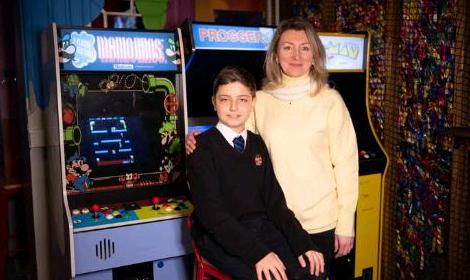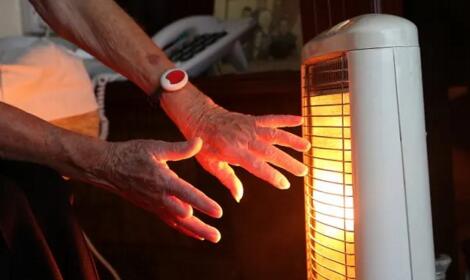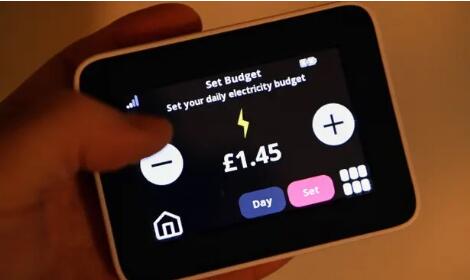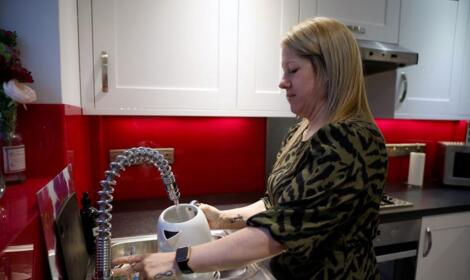在英语家庭中,兄弟姐妹是如何相互称呼的?
正文翻译

How do brothers and sisters call each other in English family?
在英语家庭中,兄弟姐妹是如何相互称呼的?

How do brothers and sisters call each other in English family?
在英语家庭中,兄弟姐妹是如何相互称呼的?
评论翻译
How do brothers and sisters call each other in English family? Do they call each other name directly, or call “sister/brother”? In Chinese family, younger sister/brother will call elder sister/brother: 姐姐/哥哥(elder sister/brother), elder sister/brother will call younger sister/brother: 妹妹/弟弟(younger sister/brother).
For example, if there’re 4 children in Chinese family, Mike is the first child, and Jack is the second boy. Mary is the third child, and Jessica is the fourth child.
Then the other children will call Mike:大哥(Big brother).
Mike will call Jack: 弟弟(younger brother) and call Mary 三妹(third sister), Jessica 四妹(fourth sister)。
and so on. You give a number when you have more than one sister or brother. So I am very curious about how children call each other in a English family.
在英语家庭中,兄弟姐妹是如何相互称呼的?他们是直接叫对方的名字,还是叫“姐姐/哥哥”?在中国家庭中,妹妹/弟弟会叫姐姐/哥哥:姐姐/哥哥,姐姐/哥哥会叫妹妹/弟弟:妹妹/弟弟。
例如,如果中国家庭有四个孩子,迈克是第一个孩子,杰克是第二个男孩。玛丽是第三个孩子,而杰西卡是第四个孩子。
那么其他孩子就会叫迈克:大哥。
麦克会叫杰克:弟弟,叫玛丽三妹,杰西卡四妹。
以此类推。当你有一个以上的妹妹或弟弟时,会冠以一个数字。所以我对英语家庭中孩子们的相互称呼非常好奇。
ponyboy42069
Usually just by name or by a personal nickname. Bro and sis are not that commonly used (they're probably used more for non family members, ironically) but it depends on the family.
一般就是喊名字或者昵称。兄弟和姐妹不是那么常用的(讽刺的是,它们可能更多用于非家庭成员),但这取决于家庭。
Salt_Tooth2894
Mostly by names, nicknames, etc. For example in the part of the USA where I grew up you'd also hear bubba and sissy a lot.
You certainly might refer to your siblings as 'my big sister' or 'my baby brother' when talking about them to other people, but it's not typical to call them that when you speak to them. You might occasionally hear an American younger sibling say 'Big brother, can you pass the potatoes' but it's just as likely they'd say 'Bob, can you pass the potatoes' or 'Hey jerkwad, pass the potatoes'. You would definitely not hear a construction like 'third sister'.
主要是喊名字、昵称等。例如,在我长大的美国地区,你也会经常听到“bubba”和“sissy”。
在与其他人谈论你的兄弟姐妹时,你当然可能会称他们为“我的大姐”或“我的弟弟”,但在与他们交谈时通常不会这样称呼他们。你可能偶尔会听到美国的弟弟妹妹说“大哥,你能把土豆递过来吗”,但他们更有可能会说“鲍勃,你能把土豆递过来吗”或“嘿混蛋,把土豆递过来”。你绝对不会听到像“三姐”这样的用词结构。
MainArtichoke3167
I call my sis "hey you come here"
我叫我姐姐“嘿,你过来”
Unknown_Predator88
They call them by their names. Sometimes “sis” or “bro”
我们以他们的名字称呼他们。有时也用“sis”或“bro”
EdwardMao
In China, it is related to politedness to call properly. Bro sounds very casual. But I get what you mean. Thanks.
在中国,称呼得当与礼貌有关。“Bro”听起来很随意。但我明白你的意思。谢谢。
culdusaq
It sounds casual, but surely you can be casual with your own family? If not them, who CAN you be casual with? I guess this might be a cultural difference most westerners would struggle to comprehend.
听起来很随意,但你不是应该和自己的家人随意一点吗?如果不是和他们,你还能和谁随便?我想这可能是大多数西方人难以理解的文化差异。
EdwardMao
When it comes to seniority in the family, Chinese are not casual. We have a sophisticated system to name each senirity. And it is polite to call properly. or people will not think you are a good guy or well educated, or even worse, they think you are not a responsible person.
谈到家庭中的辈分,中国人并不随便。我们有一个复杂的系统来命名每个辈分。而且适当称呼是有礼貌的。否则人们不会认为你是一个好人或受过良好教育的人,甚至更糟,他们会认为你不是一个负责任的人。
belethed
And in the USA, using hierarchy with family is the equivalent of formal politeness with family, it is too formal and off-putting. Intimacy in friends and family is often indicated by informality of address.
While you might call your spouse’s parents “mom and dad” as a respectful yet intimate title, if I called my husband’s parents “mom/dad” it would imply I was as close and intimate with them as my own family, as it is less formal
Edited to add: So calling my grandfather “Grandfather” sounds distant and calling him “Gramps” or “Pop” sounds loving and intimate (without losing respect).
This is why, though, my kids call their father’s mother and father Nai nai & Yeye in Chinese, but “Granny” and “Grandpa David” in English- we follow the cultural titling norms of each language we speak.
而在美国,对家人使用等级制度,相当于对家人的正式礼貌,太正式了,让人反感。朋友和家人之间的亲密关系通常通过非正式的称呼来表示。
虽然你可以把你配偶的父母称为“妈妈和爸爸”,作为一种尊敬而又亲密的称呼,但如果我把我丈夫的父母称为“"妈/爸”,就意味着我和他们的关系和我自己的家人一样亲密,因为它不那么正式。
编辑补充:因此,叫我的祖父“祖父”听起来很疏远,而叫他“爷爷”或者“Pop”听起来很有爱,很亲切(不失尊重)。
这就是为什么,我的孩子们在中文里叫他们父亲的母亲和父亲为“nainai”和“yeye”,但在英文里叫 “Granny”和“Grandpa”--我们遵循我们所讲的每种语言的文化称谓规范。
Ink_Witch
Worth noting that nicknames for grandparents like pop pop for grandpa are a big thing in the US. The common ones vary regionally, and there are a ton of variations, but people often like to make up their own unique ones. The personalization makes it more intimate.
In general formal titles where relative position is established are reserved for professional or academic contexts. Making too much of a distinction of hierarchy with close relations is frowned upon, for example It would be considered rude to ask your friends to use any formal titles like doctor. Beyond that very close friendships or family relationships often come with nicknames, because even using their name can feel too formal. It’s not uncommon to have like 10 nicknames for your dog, and romantic partners often have secret nicknames for each other called pet names.
If you were to call a family member “elder brother” it would feel stiff and uncomfortable, and would probably come off as an attempt to distance yourself from them rather than show respect.
值得注意的是,对祖父母的昵称,如爷爷的“pop pop”,在美国是一件大事。常见的称呼因地区而异,而且有很大的变化,但人们往往喜欢编造他们自己独特的名字。这种个性化的称呼使其更显亲密。
一般来说,确立相对地位的正式头衔是保留给专业或学术背景的。与亲密关系的人做太多的等级区分是不受欢迎的,例如,要求你的朋友使用任何像医生这样的正式头衔来称呼你会被认为是不礼貌的。除此之外,非常亲密的友谊或家庭关系往往带有绰号,因为即使使用他们的名字也会感觉太正式。为你的狗起10个左右的绰号并不罕见,而伴侣往往为对方起秘密的绰号,称为爱称。
如果你叫一个家庭成员“哥哥”,会感觉很生硬和不舒服,而且可能会被认为是试图与他们保持距离,而不是表示尊重。
Chaosbuggy
It's rude in English to use your parent's names when talking to them. Mom/dad IS the polite way to refer to them. In some cultures, you might call them Sir/Ma'am. Same thing for Grandma/Grandpa. For aunts and uncle, you just say Aunt/Uncle in front of their first name. We don't have polite ways of referring to siblings or cousins. Bro/sis is not polite, it's a fun thing to call them. 'Cuz' for cousin works the same way.
In English, to be polite, you use different vocabulary. You wouldn't use slang or curse words with an older family member, but you might with a sibling or cousin that is close in age to you.
在英语里与父母交谈时直接使用父母的名字是不礼貌的。妈/爸是称呼他们的礼貌方式。在某些文化中,也可能称他们为先生/女士。奶奶/爷爷也一样。对于阿姨和叔叔,你只需在他们的名字前加上阿姨/叔叔。我们没有礼貌的方式来称呼兄弟姐妹或堂兄弟姐妹。 “Bro/sis” 不是礼貌的方式,而是一种轻快的方式。喊表亲“Cuz”也是同样的原理。
在英语中,为了礼貌,你会使用不同的词汇。你不会对年长的家庭成员使用俚语或脏话,但你可能会对与你年龄相近的兄弟姐妹或堂兄弟姐妹使用。
Thoughtful_Tortoise
In British English I wouldn't call it rude to use your parents' names once you're an adult. At least in my family it's normal.
在英式英语中,一旦你成年,我不会认为使用你父母的名字是粗鲁的。至少在我家是正常的。
tnemmoc_on
It's not rude in the US either. It's just different in different families.
这在美国也不粗鲁。只是在不同的家庭中有所不同。
Chaosbuggy
Where in the US are you? I'm in the midwest and have only seen kids call their parents by first name to imply something negative about them (like they aren't a good parent, or are more of a friend than a parent). I don't doubt that there are some families that do this without disrespect being intended, but when it comes to teaching someone English, I would err towards generalizations with being polite.
你在美国的什么地方?我在中西部,只见过孩子们直呼父母的名字以暗示他们有一些负面情绪(比如他们不是一个好父母,或者更像是一个朋友而不是父母)。我不怀疑有一些家庭这样做并且没有不尊重的意思,但是当涉及到教别人英语的时候,我认为这么做在礼貌的辈分称呼方面是错误的。
adrianmonk
In English (at least where I live), the rule is basically that if they are an earlier generation, then you use a title, and if you don't, it's disrespectful. If they are the same generation as you or a younger generation, you do not need to use a title and you can call them by name.
Older generation:
parents: You don't use their names. You call them "Mom" or "Dad". Some people say "Mother" or "Father", but it's pretty formal and old-fashioned. There are some other variations like "Ma" and "Pa" (old-fashioned). Also "Pop" (for fathers), but I think this may be regional.,
在英语中(至少在我居住的地方),规则基本上是,如果他们是长辈,那么你就使用头衔,如果你不这样做,那就是不尊重人。如果他们与你同辈或晚辈,你可以不用称呼头衔,可以直呼其名。
长辈:
父母:你不用他们的名字。你称他们为“妈”或“爸”。有人会喊“母亲”或“父亲”,但这是非常正式和老套的。还有一些其他变体,如“Ma”和“Pa”(老式)。还有“Pop”(对于父亲),但我认为这可能是地区性的。
aunts and uncles: You use their name AND a title, like "Aunt Jennifer" or "Uncle Jim". You usually don't say just "Aunt" or "Uncle". It wouldn't be disrespectful, but it isn't how a native would say it.
grandparents: You don't use their names. You call them some title like "Grandma" or "Grandpa". There are a lot of variations on this like "Granny", "Gran", "Nana", and "Memaw" (instead of "Grandma") and "Grampa", "Granddad", "Papaw", and "Pop-Pop" (instead of "Grandpa"), and each family has their own way of saying it.
阿姨和叔叔:你使用他们的名字和头衔,例如“詹妮弗阿姨”或“吉姆叔叔”。你通常不会只说“阿姨”或“叔叔”。这不会是不尊重,但英语土著不会这么说的。
祖父母:你不使用他们的名字。你叫他们一些头衔,如“奶奶”或“爷爷”。这方面有很多变体,如“Granny”、“Gran”、“Nana”和“Memaw”(而不是“Grandma”)以及“Grampa”、“Granddad”、“Papaw”和“Pop-Pop”(而不是“Grandpa”),每个家庭都有自己的说法。
Same generation:
sisters and brothers: You call them by their name. You can also call them "sister" or "brother" if you want, but it's not required, and sounds very formal and old-fashioned. You can call them "sis" or "bro", but it's not something I'd do often.
cousins: You can call them by name, but it's also common to use a title and a name. If your cousin is named Cindy, you can say "Cindy" or "Cousin Cindy".
平辈:
姐妹和兄弟:你用他们的名字来称呼他们。如果你愿意,你也可以叫他们“姐姐”或“哥哥”,但这不是必须的,而且听起来非常正式和老式。你可以叫他们“姐”或“哥”,但我们也不经常这么喊。
表兄妹:你可以直呼其名,但使用头衔和名字也很常见。如果你的表妹叫辛迪,你可以喊“辛迪”或“辛迪表妹”。
Younger generation:
children: Obviously you call them by name. You can also say "Son" or "Daughter", although to me it sounds a little weird.
nieces and nephews (your brothers' and sisters' children): You can call them by name.
grandchildren: You call them by name.
For people your same generation or younger, when you add a title to their name (saying "Cousin Cindy" instead of "Cindy"), it emphasizes the family connection. It's not so much about showing respect, and it's more like saying they're part of the family. For older generations, the title is for showing respect.
晚辈:
儿女:很明显,你叫他们的名字。你也可以喊“儿子”或“女儿”,尽管对我来说这听起来有点奇怪。
侄女和侄子(你的兄弟和姐妹的孩子): 你可以直接叫他们的名字。
孙子孙女:你叫他们的名字。
对于与你同辈或更年轻的人,当你在他们的名字上加上一个头衔(比如说“辛迪表妹”而不是“辛迪”),它强调了家庭联系。这与其说是表示尊重,不如说是表明他们是家庭的一份子。对于老一辈人来说,使用头衔是为了表示尊重。
skeptimist
Is this the American South? They are definitely more formal.
这是美国南部吗?他们确实更正式。
TheRealSugarbat
The only major differences between the South and other areas of the country are 1. Southerners (especially children) often will use “sir” and “ma’am” (“yes sir” and “no ma’am,” even with family) in conversation and 2. often when addressing non-family members, it’s polite for children to use “miss” or “mister” in front of first names. So a kid might address an adult neighbor with “Miss Anne” instead of just “Anne.” Source: am Southern
南方与本国其他地区之间唯一的主要区别是 1. 南方人(尤其是儿童)经常会使用“先生”和“女士”(“是的,先生”和“不是,女士”,即使是在家人面前也是如此) 2. 通常在称呼非家庭成员时,孩子们在名字前使用“小姐”或“先生”被认为是有礼貌的。所以一个孩子可能会用“安妮小姐”而不是“安妮”来称呼成年邻居。
来源:我是南方人
ligirl
I was watching a livestream from a southern youtuber and he asked his kid a yes/no question and the kid responded with "yes sir". I'm from New England and I was so thrown. Sir for me is only used for strangers whose name you do not know, indicating respect but a significant amount of emotional distance.
我正在观看来自南方的油管博主的直播,他问他的孩子一个是或否的问题,孩子回答“是的,先生”。我来自新英格兰,我一脸迷惑。“先生”这个称呼对于我来说只用于你不知道名字的陌生人,表示尊重但有很大的情感距离。
TheRealSugarbat
Yeah, it can definitely be a bit of a culture shock. Similarly, when I first traveled out of the South and heard a kid say, “Yeah,” to a grownup, I was all, “the cheek!” I would’ve been snatched baldheaded as a child for saying “yeah” or “nah” to a grownup.
是的,这绝对是一种文化冲击。同样,当我第一次走出南方,听到一个孩子用“Yeah”来回应一个大人的时候,我完全被震惊了。我小时候会因为对大人说“yeah”或“nah”而被教训。
Remote_Foundation_32
...I have noticed a great tendency in the South to refer to people by their Title and given name, instead of surname. So, Mr. Joe or Miss Jill, etc
...我注意到南方有一种很大的倾向,就是用头衔+名字来称呼人们,而不是用姓氏。比如,乔先生或吉尔小姐等
TheRealSugarbat
Yep. Like I said. Especially when children are addressing adults.
是的。就像我说的。特别是当孩子们对大人说话时。
ishishkin
“Cousin Cindy” sounds old-fashioned to me (native speaker from the mid-Atlantic); what part of the US do you hear this in? Just wondering.
“辛迪表妹”对我来说听起来很老套(来自大西洋中部的英语母语人士);你在美国的哪个地方听到有人这么喊?只是好奇。
CollectionStraight2
My aunts and uncles always wanted me to call them just by their names, no titles, even when I was a little kid. Maybe my family is odd. Also I'm Irish. I think the US is more formal about this stuff. I can't rememeber the last time I called someone Mr or Mrs Whatever, even if they're the older generation. People here introduce themselves with first names nowadays. I think this is a cultural difference
我的阿姨和叔叔总是希望我只用他们的名字称呼他们,不加头衔,即使在我还是个小孩的时候也是如此。也许我的家人很奇怪吧。另外我是爱尔兰人。我认为美国在这方面更正式。我不记得上次我称呼某人“先生” 或“某某小姐”是什么时候了,即使他们是长辈。现在这里的人都用名字来介绍自己。我觉得这是文化差异
ApprenticePantyThief
This is less important in many English speaking countries. I've called most of my bosses by their first name or a nickname for almost my entire working career. I've worked at companies where we all called even the Vice President and President of the company by their first name or a nickname.
这在许多英语国家不是很重要。在我几乎整个职业生涯中,我都用名字或昵称来称呼我的大多数老板。我曾在公司工作过,我们甚至都直呼公司的副总裁和总裁的名字或昵称。
EntryLevelHuman00
I wouldn’t actually use “bro”. As others have pointed out, it’s ironically something you’d say more to someone who isn’t actually your sibling. You really wouldn’t call them that while talking to them, you’d just use their name or a nickname.
我实际上不会使用“bro”。正如其他人指出的那样,讽刺的是,你更多地会对实际上不是你兄弟姐妹的人使用。在跟亲兄弟姐妹说话的时候,你真的不会这样称呼他们,你只会使用他们的名字或昵称。
Unknown_Predator88
East Asian countries are very respectful, while European languages are far more lax (generally).
东亚国家非常尊重他人,而欧洲语言则宽松得多(通常)。
CollectionStraight2
Yeah it's supposed to be casual. Being casual with siblings is the norm in the US/UK and other English speaking places. We do it to the point of good-natured mocking, to be honest.
This is a very interesting question. I never thought of calling brothers/sisters anything special before. Thanks for teaching me about Chinese culture!
是的,它本就应该是随意的。在美国/英国和其他英语国家,与兄弟姐妹随意相处是常态。老实说,我们这样做是为了善意的嘲讽。
这是一个非常有趣的问题。我以前从没想过要称呼兄弟姐妹有什么特别的。谢谢你教我中国文化!
BillWeld
It would be strange for an American kid to address his parents by name and strange for him to address his siblings by title.
对于一个美国孩子来说,直呼父母的名字是很奇怪的,而用头衔来称呼兄弟姐妹也是奇怪的。
FirstPianist3312
I call my brother "dumbass"
In all seriousness, we dont have an honorifics system when it comes to siblings, we just call them by name
我叫我弟弟“笨蛋”
说真的,我们对兄弟姐妹没有敬语系统,我们只是直呼他们的名字
atashivanpaia
Nicknames like sis or bro are usually used among children or in jest. Normally we use names or nicknames/insults (ie dipshit or asshole)
sis 或 bro 之类的昵称通常用于儿童之间或开玩笑。通常我们使用名字或昵称/侮辱(即笨蛋或混蛋)
Allie614032
I just call my sister by her name! My family has a nickname for her but I never use it when speaking to or calling for her. She’ll either call me by my name or my family nickname.
我就那么喊我姐姐的名字!我的家人给她起了个绰号,但我在和她说话或打电话给她时从不使用它。她要么喊我的名字,要么叫我的昵称。
un-apres-midi
I sometimes call my sister "dude" or "bruh"
我有时称我妹妹为“dude”或“bruh”
Sprocketvgc
On more than one occasion I have addressed my wife by "dude". Calling my little sister "dude" is also common (we are both adults now).
我不止一次用“dude”来称呼我的妻子。也经常这么喊我妹妹(我们现在都是成年人了)。
un-apres-midi
It's become a gender-neutral term for me!
对我来说,它已成为一个中立性别的术语!
Individual-Copy6198
Common: their first name.
Less common: a nickname.
Even less common: Bro or Sis.
None of these would be out of place. We don’t use any other words for siblings.
常见:直接喊他们的名字。
不太常见的是:昵称。
更不常见的是:兄弟或姐妹。
这些都不会有什么不妥之处。我们对兄弟姐妹不使用任何其他词汇。
modulusshift
I nicknamed my older siblings Bubbie and Sissie, but I was the youngest by over a decade, it was just considered a cutesy thing for a little kid to say that ended up sticking.
At least in the US, family relations vary on a case-by-case basis. How siblings relate is often a function of individual parenting style, and even then a lot of parents are very hands-off in general, letting the kids self-sort. It’s not like “but I’m oldest” isn’t generally considered a reasonable basis for some privileges, but it must be continually asserted and occasionally fought hard for if it’s going to work, nothing comes easily to a passive older brother.
Also for what it’s worth, the attempt to translate similar terms from anime into English made the most obvious candidates “big bro”, “little sis” etc. feel a little like signifiers of ludicrous hentai situations. Like the infamous “oh no, I’m stuck in the washing machine door big bro”. (But at least it’s not “step bro”, that one is much worse.)
我给我的哥哥姐姐起了绰号“Bubbie”和“Sissie”,但我是最小的一个,年龄差超过十岁,这只是被认为是一个小孩子的可爱之举。
至少在美国,家庭关系因人而异。兄弟姐妹之间的关系通常取决于个人的养育方式,即便如此,很多父母通常还是很放任自流,让孩子们自己排序。并不是说“我是年纪最大的”通常不被认为是某些特权的合理基础,但它必须不断地坚持自己的主张并偶尔努力争取,对于一个性格被动的哥哥来说,这可没那么容易。
同样值得一提的是,将动漫中的类似术语翻译成英语的尝试,比如最常见的“大哥”、“小妹”等给人的感觉有点像是会出现在荒诞的绅士场景中。比如臭名昭著的“哦,不,我被洗衣机卡住了,快来拉我一下,大哥”。 (不过至少不是“继兄弟”,那个更糟糕。)
king-of-new_york
We just have "older/younger brother/sister." Mike is an older brother to everyone. Jack is an older brother to Mary and Jessica, but a younger brother to Mike. Jack can also be called a "younger older brother" to show that he was the second son. Jessica will always be a younger sister, but can also be referred to a "youngest" sister to differentiate her from Mary.
我们只有“哥哥/弟弟/妹妹”。迈克是每个人的哥哥。杰克是玛丽和杰西卡的哥哥,是迈克的弟弟。杰克也可以被称为“年轻的哥哥”,以表明他是次子。杰西卡永远是妹妹,但也可以称为“最小”的妹妹,以区别于玛丽。
BubbhaJebus
Native Speaker of American English (West Coast)
Generally we address our siblings by their name (e.g. Robert), shortened form of their name (e.g., Rob, Bob, Bobby), or a nickname, whichever one the recipient prefers. We almost never directly address a sibling as "brother" or "sister"; in fact, it would sound very strange to do so. Sometimes we read stories translated from other languages, and it might feature a character addressing a sibling as "eldest brother" or "third sister", and it sounds very artificial in English, though I'm aware that it's normal for that culture.
Some people say "bro" or "sis", though this is rare.
If we're talking to a third party about our sibling, we often say "my brother" or "my sister". If relative age is important to the situation, we might say "my big sister" or "my youngest brother".
一般来说,我们对兄弟姐妹的称呼是他们的名字(如Robert),他们名字的简称(如Rob,Bob,Bobby),或昵称,以接受者喜欢的为准。我们几乎从不直接称呼兄弟姐妹为“brother”或“sister”;事实上,这样做听起来非常奇怪。有时我们读到从其他语言翻译过来的故事,故事中的人物可能会以“长兄”或“三妹”来称呼一个兄弟姐妹,这在英语中听起来非常做作,尽管我知道这在该文化中是正常的。
有些人会称呼“bro”或 “sis”,尽管这也很罕见。
如果我们和第三方谈论我们的兄弟姐妹,我们经常说“我的兄弟”或“我的姐妹”。如果相对年龄在语境中很重要,我们可能会说“我的大姐姐”或“我最小的弟弟”。
AikoG84
I've always just called my sisters by their names or family nickname (my oldest sister had a short name so no nickname, middle sister and me have longer names so we had nicknames). Sometimes "hey sissy" when i want something and I'm trying to be cute. There really isn't any honorific or respect terms specifically for this like some other languages have.
我一直只是叫我姐姐们的名字或家庭昵称(我的大姐名字短,所以没有昵称,中间的姐姐和我的名字都挺长,所以我们有昵称)。有时,当我想要什么东西而我又想表现得贴心时,就叫“嘿,sissy”。真的没有像其他一些语言那样有专门的尊称或敬语。
NakDisNut
“Aye bitch” - me to my brother
“诶,贱人”——我对我弟弟的称呼
jrlamb
We call each other by name or nickname. If we are describing or introducing one, we may say "This is my older sister, Pat." Normally we don't use "older" or "younger" unless specifically asked in what order we are. It would be "This is my brother, Dennis, and my sister, Pat. "
我们用名字或绰号来称呼对方。如果我们正在描述或介绍一个人,我们可能会说“这是我的姐姐,帕特”。通常我们不使用“年长的”或“年轻的”,除非特别询问我们是什么顺序。一般情况下就是“这是我的兄弟丹尼斯和我的姐妹帕特。”
branfordsquirrel
I’ve found that Chinese place a lot of emphasis on familial relationships (for example, your paternal and maternal grandparents have different names, in English it’s just “grandmother” and “grandfather”).
In English for a lot of family relationships, you call each other by a nickname. For example, a maternal grandmother could be Nana and the paternal grandmother could be Camma (mix of “grandma” and “Catherine”).
我发现中国人非常重视家庭关系(例如,祖父母和外祖父母的称呼不同,在英语中就都只是“祖母”和“祖父”)。
在英语中,很多家庭关系都是用昵称互相称呼。例如,外祖母可以是“Nana”,而祖母可以是“Camma”(“祖母”和“凯瑟琳”的混合体)。
Cason_darrow
When talking to your siblings use first names. When talking about them to someone who doesn't know them you would typically say "my brother" or "my brother John" so you can say John in the future and they will know who he is.
当与你的兄弟姐妹交谈时,使用他们的名字。当与不认识他们的人谈论他们时,你通常会说 “我的兄弟”或“我的兄弟约翰”,这样你以后就可以只说约翰,他们就会知道他是谁。
Sutaapureea
It's almost exclusively by first name. Age distinctions really don't exist is this way in English.
几乎都是直接喊名字。英语中确实不存在年龄差异。
For example, if there’re 4 children in Chinese family, Mike is the first child, and Jack is the second boy. Mary is the third child, and Jessica is the fourth child.
Then the other children will call Mike:大哥(Big brother).
Mike will call Jack: 弟弟(younger brother) and call Mary 三妹(third sister), Jessica 四妹(fourth sister)。
and so on. You give a number when you have more than one sister or brother. So I am very curious about how children call each other in a English family.
在英语家庭中,兄弟姐妹是如何相互称呼的?他们是直接叫对方的名字,还是叫“姐姐/哥哥”?在中国家庭中,妹妹/弟弟会叫姐姐/哥哥:姐姐/哥哥,姐姐/哥哥会叫妹妹/弟弟:妹妹/弟弟。
例如,如果中国家庭有四个孩子,迈克是第一个孩子,杰克是第二个男孩。玛丽是第三个孩子,而杰西卡是第四个孩子。
那么其他孩子就会叫迈克:大哥。
麦克会叫杰克:弟弟,叫玛丽三妹,杰西卡四妹。
以此类推。当你有一个以上的妹妹或弟弟时,会冠以一个数字。所以我对英语家庭中孩子们的相互称呼非常好奇。
ponyboy42069
Usually just by name or by a personal nickname. Bro and sis are not that commonly used (they're probably used more for non family members, ironically) but it depends on the family.
一般就是喊名字或者昵称。兄弟和姐妹不是那么常用的(讽刺的是,它们可能更多用于非家庭成员),但这取决于家庭。
Salt_Tooth2894
Mostly by names, nicknames, etc. For example in the part of the USA where I grew up you'd also hear bubba and sissy a lot.
You certainly might refer to your siblings as 'my big sister' or 'my baby brother' when talking about them to other people, but it's not typical to call them that when you speak to them. You might occasionally hear an American younger sibling say 'Big brother, can you pass the potatoes' but it's just as likely they'd say 'Bob, can you pass the potatoes' or 'Hey jerkwad, pass the potatoes'. You would definitely not hear a construction like 'third sister'.
主要是喊名字、昵称等。例如,在我长大的美国地区,你也会经常听到“bubba”和“sissy”。
在与其他人谈论你的兄弟姐妹时,你当然可能会称他们为“我的大姐”或“我的弟弟”,但在与他们交谈时通常不会这样称呼他们。你可能偶尔会听到美国的弟弟妹妹说“大哥,你能把土豆递过来吗”,但他们更有可能会说“鲍勃,你能把土豆递过来吗”或“嘿混蛋,把土豆递过来”。你绝对不会听到像“三姐”这样的用词结构。
MainArtichoke3167
I call my sis "hey you come here"
我叫我姐姐“嘿,你过来”
Unknown_Predator88
They call them by their names. Sometimes “sis” or “bro”
我们以他们的名字称呼他们。有时也用“sis”或“bro”
EdwardMao
In China, it is related to politedness to call properly. Bro sounds very casual. But I get what you mean. Thanks.
在中国,称呼得当与礼貌有关。“Bro”听起来很随意。但我明白你的意思。谢谢。
culdusaq
It sounds casual, but surely you can be casual with your own family? If not them, who CAN you be casual with? I guess this might be a cultural difference most westerners would struggle to comprehend.
听起来很随意,但你不是应该和自己的家人随意一点吗?如果不是和他们,你还能和谁随便?我想这可能是大多数西方人难以理解的文化差异。
EdwardMao
When it comes to seniority in the family, Chinese are not casual. We have a sophisticated system to name each senirity. And it is polite to call properly. or people will not think you are a good guy or well educated, or even worse, they think you are not a responsible person.
谈到家庭中的辈分,中国人并不随便。我们有一个复杂的系统来命名每个辈分。而且适当称呼是有礼貌的。否则人们不会认为你是一个好人或受过良好教育的人,甚至更糟,他们会认为你不是一个负责任的人。
belethed
And in the USA, using hierarchy with family is the equivalent of formal politeness with family, it is too formal and off-putting. Intimacy in friends and family is often indicated by informality of address.
While you might call your spouse’s parents “mom and dad” as a respectful yet intimate title, if I called my husband’s parents “mom/dad” it would imply I was as close and intimate with them as my own family, as it is less formal
Edited to add: So calling my grandfather “Grandfather” sounds distant and calling him “Gramps” or “Pop” sounds loving and intimate (without losing respect).
This is why, though, my kids call their father’s mother and father Nai nai & Yeye in Chinese, but “Granny” and “Grandpa David” in English- we follow the cultural titling norms of each language we speak.
而在美国,对家人使用等级制度,相当于对家人的正式礼貌,太正式了,让人反感。朋友和家人之间的亲密关系通常通过非正式的称呼来表示。
虽然你可以把你配偶的父母称为“妈妈和爸爸”,作为一种尊敬而又亲密的称呼,但如果我把我丈夫的父母称为“"妈/爸”,就意味着我和他们的关系和我自己的家人一样亲密,因为它不那么正式。
编辑补充:因此,叫我的祖父“祖父”听起来很疏远,而叫他“爷爷”或者“Pop”听起来很有爱,很亲切(不失尊重)。
这就是为什么,我的孩子们在中文里叫他们父亲的母亲和父亲为“nainai”和“yeye”,但在英文里叫 “Granny”和“Grandpa”--我们遵循我们所讲的每种语言的文化称谓规范。
Ink_Witch
Worth noting that nicknames for grandparents like pop pop for grandpa are a big thing in the US. The common ones vary regionally, and there are a ton of variations, but people often like to make up their own unique ones. The personalization makes it more intimate.
In general formal titles where relative position is established are reserved for professional or academic contexts. Making too much of a distinction of hierarchy with close relations is frowned upon, for example It would be considered rude to ask your friends to use any formal titles like doctor. Beyond that very close friendships or family relationships often come with nicknames, because even using their name can feel too formal. It’s not uncommon to have like 10 nicknames for your dog, and romantic partners often have secret nicknames for each other called pet names.
If you were to call a family member “elder brother” it would feel stiff and uncomfortable, and would probably come off as an attempt to distance yourself from them rather than show respect.
值得注意的是,对祖父母的昵称,如爷爷的“pop pop”,在美国是一件大事。常见的称呼因地区而异,而且有很大的变化,但人们往往喜欢编造他们自己独特的名字。这种个性化的称呼使其更显亲密。
一般来说,确立相对地位的正式头衔是保留给专业或学术背景的。与亲密关系的人做太多的等级区分是不受欢迎的,例如,要求你的朋友使用任何像医生这样的正式头衔来称呼你会被认为是不礼貌的。除此之外,非常亲密的友谊或家庭关系往往带有绰号,因为即使使用他们的名字也会感觉太正式。为你的狗起10个左右的绰号并不罕见,而伴侣往往为对方起秘密的绰号,称为爱称。
如果你叫一个家庭成员“哥哥”,会感觉很生硬和不舒服,而且可能会被认为是试图与他们保持距离,而不是表示尊重。
Chaosbuggy
It's rude in English to use your parent's names when talking to them. Mom/dad IS the polite way to refer to them. In some cultures, you might call them Sir/Ma'am. Same thing for Grandma/Grandpa. For aunts and uncle, you just say Aunt/Uncle in front of their first name. We don't have polite ways of referring to siblings or cousins. Bro/sis is not polite, it's a fun thing to call them. 'Cuz' for cousin works the same way.
In English, to be polite, you use different vocabulary. You wouldn't use slang or curse words with an older family member, but you might with a sibling or cousin that is close in age to you.
在英语里与父母交谈时直接使用父母的名字是不礼貌的。妈/爸是称呼他们的礼貌方式。在某些文化中,也可能称他们为先生/女士。奶奶/爷爷也一样。对于阿姨和叔叔,你只需在他们的名字前加上阿姨/叔叔。我们没有礼貌的方式来称呼兄弟姐妹或堂兄弟姐妹。 “Bro/sis” 不是礼貌的方式,而是一种轻快的方式。喊表亲“Cuz”也是同样的原理。
在英语中,为了礼貌,你会使用不同的词汇。你不会对年长的家庭成员使用俚语或脏话,但你可能会对与你年龄相近的兄弟姐妹或堂兄弟姐妹使用。
Thoughtful_Tortoise
In British English I wouldn't call it rude to use your parents' names once you're an adult. At least in my family it's normal.
在英式英语中,一旦你成年,我不会认为使用你父母的名字是粗鲁的。至少在我家是正常的。
tnemmoc_on
It's not rude in the US either. It's just different in different families.
这在美国也不粗鲁。只是在不同的家庭中有所不同。
Chaosbuggy
Where in the US are you? I'm in the midwest and have only seen kids call their parents by first name to imply something negative about them (like they aren't a good parent, or are more of a friend than a parent). I don't doubt that there are some families that do this without disrespect being intended, but when it comes to teaching someone English, I would err towards generalizations with being polite.
你在美国的什么地方?我在中西部,只见过孩子们直呼父母的名字以暗示他们有一些负面情绪(比如他们不是一个好父母,或者更像是一个朋友而不是父母)。我不怀疑有一些家庭这样做并且没有不尊重的意思,但是当涉及到教别人英语的时候,我认为这么做在礼貌的辈分称呼方面是错误的。
adrianmonk
In English (at least where I live), the rule is basically that if they are an earlier generation, then you use a title, and if you don't, it's disrespectful. If they are the same generation as you or a younger generation, you do not need to use a title and you can call them by name.
Older generation:
parents: You don't use their names. You call them "Mom" or "Dad". Some people say "Mother" or "Father", but it's pretty formal and old-fashioned. There are some other variations like "Ma" and "Pa" (old-fashioned). Also "Pop" (for fathers), but I think this may be regional.,
在英语中(至少在我居住的地方),规则基本上是,如果他们是长辈,那么你就使用头衔,如果你不这样做,那就是不尊重人。如果他们与你同辈或晚辈,你可以不用称呼头衔,可以直呼其名。
长辈:
父母:你不用他们的名字。你称他们为“妈”或“爸”。有人会喊“母亲”或“父亲”,但这是非常正式和老套的。还有一些其他变体,如“Ma”和“Pa”(老式)。还有“Pop”(对于父亲),但我认为这可能是地区性的。
aunts and uncles: You use their name AND a title, like "Aunt Jennifer" or "Uncle Jim". You usually don't say just "Aunt" or "Uncle". It wouldn't be disrespectful, but it isn't how a native would say it.
grandparents: You don't use their names. You call them some title like "Grandma" or "Grandpa". There are a lot of variations on this like "Granny", "Gran", "Nana", and "Memaw" (instead of "Grandma") and "Grampa", "Granddad", "Papaw", and "Pop-Pop" (instead of "Grandpa"), and each family has their own way of saying it.
阿姨和叔叔:你使用他们的名字和头衔,例如“詹妮弗阿姨”或“吉姆叔叔”。你通常不会只说“阿姨”或“叔叔”。这不会是不尊重,但英语土著不会这么说的。
祖父母:你不使用他们的名字。你叫他们一些头衔,如“奶奶”或“爷爷”。这方面有很多变体,如“Granny”、“Gran”、“Nana”和“Memaw”(而不是“Grandma”)以及“Grampa”、“Granddad”、“Papaw”和“Pop-Pop”(而不是“Grandpa”),每个家庭都有自己的说法。
Same generation:
sisters and brothers: You call them by their name. You can also call them "sister" or "brother" if you want, but it's not required, and sounds very formal and old-fashioned. You can call them "sis" or "bro", but it's not something I'd do often.
cousins: You can call them by name, but it's also common to use a title and a name. If your cousin is named Cindy, you can say "Cindy" or "Cousin Cindy".
平辈:
姐妹和兄弟:你用他们的名字来称呼他们。如果你愿意,你也可以叫他们“姐姐”或“哥哥”,但这不是必须的,而且听起来非常正式和老式。你可以叫他们“姐”或“哥”,但我们也不经常这么喊。
表兄妹:你可以直呼其名,但使用头衔和名字也很常见。如果你的表妹叫辛迪,你可以喊“辛迪”或“辛迪表妹”。
Younger generation:
children: Obviously you call them by name. You can also say "Son" or "Daughter", although to me it sounds a little weird.
nieces and nephews (your brothers' and sisters' children): You can call them by name.
grandchildren: You call them by name.
For people your same generation or younger, when you add a title to their name (saying "Cousin Cindy" instead of "Cindy"), it emphasizes the family connection. It's not so much about showing respect, and it's more like saying they're part of the family. For older generations, the title is for showing respect.
晚辈:
儿女:很明显,你叫他们的名字。你也可以喊“儿子”或“女儿”,尽管对我来说这听起来有点奇怪。
侄女和侄子(你的兄弟和姐妹的孩子): 你可以直接叫他们的名字。
孙子孙女:你叫他们的名字。
对于与你同辈或更年轻的人,当你在他们的名字上加上一个头衔(比如说“辛迪表妹”而不是“辛迪”),它强调了家庭联系。这与其说是表示尊重,不如说是表明他们是家庭的一份子。对于老一辈人来说,使用头衔是为了表示尊重。
skeptimist
Is this the American South? They are definitely more formal.
这是美国南部吗?他们确实更正式。
TheRealSugarbat
The only major differences between the South and other areas of the country are 1. Southerners (especially children) often will use “sir” and “ma’am” (“yes sir” and “no ma’am,” even with family) in conversation and 2. often when addressing non-family members, it’s polite for children to use “miss” or “mister” in front of first names. So a kid might address an adult neighbor with “Miss Anne” instead of just “Anne.” Source: am Southern
南方与本国其他地区之间唯一的主要区别是 1. 南方人(尤其是儿童)经常会使用“先生”和“女士”(“是的,先生”和“不是,女士”,即使是在家人面前也是如此) 2. 通常在称呼非家庭成员时,孩子们在名字前使用“小姐”或“先生”被认为是有礼貌的。所以一个孩子可能会用“安妮小姐”而不是“安妮”来称呼成年邻居。
来源:我是南方人
ligirl
I was watching a livestream from a southern youtuber and he asked his kid a yes/no question and the kid responded with "yes sir". I'm from New England and I was so thrown. Sir for me is only used for strangers whose name you do not know, indicating respect but a significant amount of emotional distance.
我正在观看来自南方的油管博主的直播,他问他的孩子一个是或否的问题,孩子回答“是的,先生”。我来自新英格兰,我一脸迷惑。“先生”这个称呼对于我来说只用于你不知道名字的陌生人,表示尊重但有很大的情感距离。
TheRealSugarbat
Yeah, it can definitely be a bit of a culture shock. Similarly, when I first traveled out of the South and heard a kid say, “Yeah,” to a grownup, I was all, “the cheek!” I would’ve been snatched baldheaded as a child for saying “yeah” or “nah” to a grownup.
是的,这绝对是一种文化冲击。同样,当我第一次走出南方,听到一个孩子用“Yeah”来回应一个大人的时候,我完全被震惊了。我小时候会因为对大人说“yeah”或“nah”而被教训。
Remote_Foundation_32
...I have noticed a great tendency in the South to refer to people by their Title and given name, instead of surname. So, Mr. Joe or Miss Jill, etc
...我注意到南方有一种很大的倾向,就是用头衔+名字来称呼人们,而不是用姓氏。比如,乔先生或吉尔小姐等
TheRealSugarbat
Yep. Like I said. Especially when children are addressing adults.
是的。就像我说的。特别是当孩子们对大人说话时。
ishishkin
“Cousin Cindy” sounds old-fashioned to me (native speaker from the mid-Atlantic); what part of the US do you hear this in? Just wondering.
“辛迪表妹”对我来说听起来很老套(来自大西洋中部的英语母语人士);你在美国的哪个地方听到有人这么喊?只是好奇。
CollectionStraight2
My aunts and uncles always wanted me to call them just by their names, no titles, even when I was a little kid. Maybe my family is odd. Also I'm Irish. I think the US is more formal about this stuff. I can't rememeber the last time I called someone Mr or Mrs Whatever, even if they're the older generation. People here introduce themselves with first names nowadays. I think this is a cultural difference
我的阿姨和叔叔总是希望我只用他们的名字称呼他们,不加头衔,即使在我还是个小孩的时候也是如此。也许我的家人很奇怪吧。另外我是爱尔兰人。我认为美国在这方面更正式。我不记得上次我称呼某人“先生” 或“某某小姐”是什么时候了,即使他们是长辈。现在这里的人都用名字来介绍自己。我觉得这是文化差异
ApprenticePantyThief
This is less important in many English speaking countries. I've called most of my bosses by their first name or a nickname for almost my entire working career. I've worked at companies where we all called even the Vice President and President of the company by their first name or a nickname.
这在许多英语国家不是很重要。在我几乎整个职业生涯中,我都用名字或昵称来称呼我的大多数老板。我曾在公司工作过,我们甚至都直呼公司的副总裁和总裁的名字或昵称。
EntryLevelHuman00
I wouldn’t actually use “bro”. As others have pointed out, it’s ironically something you’d say more to someone who isn’t actually your sibling. You really wouldn’t call them that while talking to them, you’d just use their name or a nickname.
我实际上不会使用“bro”。正如其他人指出的那样,讽刺的是,你更多地会对实际上不是你兄弟姐妹的人使用。在跟亲兄弟姐妹说话的时候,你真的不会这样称呼他们,你只会使用他们的名字或昵称。
Unknown_Predator88
East Asian countries are very respectful, while European languages are far more lax (generally).
东亚国家非常尊重他人,而欧洲语言则宽松得多(通常)。
CollectionStraight2
Yeah it's supposed to be casual. Being casual with siblings is the norm in the US/UK and other English speaking places. We do it to the point of good-natured mocking, to be honest.
This is a very interesting question. I never thought of calling brothers/sisters anything special before. Thanks for teaching me about Chinese culture!
是的,它本就应该是随意的。在美国/英国和其他英语国家,与兄弟姐妹随意相处是常态。老实说,我们这样做是为了善意的嘲讽。
这是一个非常有趣的问题。我以前从没想过要称呼兄弟姐妹有什么特别的。谢谢你教我中国文化!
BillWeld
It would be strange for an American kid to address his parents by name and strange for him to address his siblings by title.
对于一个美国孩子来说,直呼父母的名字是很奇怪的,而用头衔来称呼兄弟姐妹也是奇怪的。
FirstPianist3312
I call my brother "dumbass"
In all seriousness, we dont have an honorifics system when it comes to siblings, we just call them by name
我叫我弟弟“笨蛋”
说真的,我们对兄弟姐妹没有敬语系统,我们只是直呼他们的名字
atashivanpaia
Nicknames like sis or bro are usually used among children or in jest. Normally we use names or nicknames/insults (ie dipshit or asshole)
sis 或 bro 之类的昵称通常用于儿童之间或开玩笑。通常我们使用名字或昵称/侮辱(即笨蛋或混蛋)
Allie614032
I just call my sister by her name! My family has a nickname for her but I never use it when speaking to or calling for her. She’ll either call me by my name or my family nickname.
我就那么喊我姐姐的名字!我的家人给她起了个绰号,但我在和她说话或打电话给她时从不使用它。她要么喊我的名字,要么叫我的昵称。
un-apres-midi
I sometimes call my sister "dude" or "bruh"
我有时称我妹妹为“dude”或“bruh”
Sprocketvgc
On more than one occasion I have addressed my wife by "dude". Calling my little sister "dude" is also common (we are both adults now).
我不止一次用“dude”来称呼我的妻子。也经常这么喊我妹妹(我们现在都是成年人了)。
un-apres-midi
It's become a gender-neutral term for me!
对我来说,它已成为一个中立性别的术语!
Individual-Copy6198
Common: their first name.
Less common: a nickname.
Even less common: Bro or Sis.
None of these would be out of place. We don’t use any other words for siblings.
常见:直接喊他们的名字。
不太常见的是:昵称。
更不常见的是:兄弟或姐妹。
这些都不会有什么不妥之处。我们对兄弟姐妹不使用任何其他词汇。
modulusshift
I nicknamed my older siblings Bubbie and Sissie, but I was the youngest by over a decade, it was just considered a cutesy thing for a little kid to say that ended up sticking.
At least in the US, family relations vary on a case-by-case basis. How siblings relate is often a function of individual parenting style, and even then a lot of parents are very hands-off in general, letting the kids self-sort. It’s not like “but I’m oldest” isn’t generally considered a reasonable basis for some privileges, but it must be continually asserted and occasionally fought hard for if it’s going to work, nothing comes easily to a passive older brother.
Also for what it’s worth, the attempt to translate similar terms from anime into English made the most obvious candidates “big bro”, “little sis” etc. feel a little like signifiers of ludicrous hentai situations. Like the infamous “oh no, I’m stuck in the washing machine door big bro”. (But at least it’s not “step bro”, that one is much worse.)
我给我的哥哥姐姐起了绰号“Bubbie”和“Sissie”,但我是最小的一个,年龄差超过十岁,这只是被认为是一个小孩子的可爱之举。
至少在美国,家庭关系因人而异。兄弟姐妹之间的关系通常取决于个人的养育方式,即便如此,很多父母通常还是很放任自流,让孩子们自己排序。并不是说“我是年纪最大的”通常不被认为是某些特权的合理基础,但它必须不断地坚持自己的主张并偶尔努力争取,对于一个性格被动的哥哥来说,这可没那么容易。
同样值得一提的是,将动漫中的类似术语翻译成英语的尝试,比如最常见的“大哥”、“小妹”等给人的感觉有点像是会出现在荒诞的绅士场景中。比如臭名昭著的“哦,不,我被洗衣机卡住了,快来拉我一下,大哥”。 (不过至少不是“继兄弟”,那个更糟糕。)
king-of-new_york
We just have "older/younger brother/sister." Mike is an older brother to everyone. Jack is an older brother to Mary and Jessica, but a younger brother to Mike. Jack can also be called a "younger older brother" to show that he was the second son. Jessica will always be a younger sister, but can also be referred to a "youngest" sister to differentiate her from Mary.
我们只有“哥哥/弟弟/妹妹”。迈克是每个人的哥哥。杰克是玛丽和杰西卡的哥哥,是迈克的弟弟。杰克也可以被称为“年轻的哥哥”,以表明他是次子。杰西卡永远是妹妹,但也可以称为“最小”的妹妹,以区别于玛丽。
BubbhaJebus
Native Speaker of American English (West Coast)
Generally we address our siblings by their name (e.g. Robert), shortened form of their name (e.g., Rob, Bob, Bobby), or a nickname, whichever one the recipient prefers. We almost never directly address a sibling as "brother" or "sister"; in fact, it would sound very strange to do so. Sometimes we read stories translated from other languages, and it might feature a character addressing a sibling as "eldest brother" or "third sister", and it sounds very artificial in English, though I'm aware that it's normal for that culture.
Some people say "bro" or "sis", though this is rare.
If we're talking to a third party about our sibling, we often say "my brother" or "my sister". If relative age is important to the situation, we might say "my big sister" or "my youngest brother".
一般来说,我们对兄弟姐妹的称呼是他们的名字(如Robert),他们名字的简称(如Rob,Bob,Bobby),或昵称,以接受者喜欢的为准。我们几乎从不直接称呼兄弟姐妹为“brother”或“sister”;事实上,这样做听起来非常奇怪。有时我们读到从其他语言翻译过来的故事,故事中的人物可能会以“长兄”或“三妹”来称呼一个兄弟姐妹,这在英语中听起来非常做作,尽管我知道这在该文化中是正常的。
有些人会称呼“bro”或 “sis”,尽管这也很罕见。
如果我们和第三方谈论我们的兄弟姐妹,我们经常说“我的兄弟”或“我的姐妹”。如果相对年龄在语境中很重要,我们可能会说“我的大姐姐”或“我最小的弟弟”。
AikoG84
I've always just called my sisters by their names or family nickname (my oldest sister had a short name so no nickname, middle sister and me have longer names so we had nicknames). Sometimes "hey sissy" when i want something and I'm trying to be cute. There really isn't any honorific or respect terms specifically for this like some other languages have.
我一直只是叫我姐姐们的名字或家庭昵称(我的大姐名字短,所以没有昵称,中间的姐姐和我的名字都挺长,所以我们有昵称)。有时,当我想要什么东西而我又想表现得贴心时,就叫“嘿,sissy”。真的没有像其他一些语言那样有专门的尊称或敬语。
NakDisNut
“Aye bitch” - me to my brother
“诶,贱人”——我对我弟弟的称呼
jrlamb
We call each other by name or nickname. If we are describing or introducing one, we may say "This is my older sister, Pat." Normally we don't use "older" or "younger" unless specifically asked in what order we are. It would be "This is my brother, Dennis, and my sister, Pat. "
我们用名字或绰号来称呼对方。如果我们正在描述或介绍一个人,我们可能会说“这是我的姐姐,帕特”。通常我们不使用“年长的”或“年轻的”,除非特别询问我们是什么顺序。一般情况下就是“这是我的兄弟丹尼斯和我的姐妹帕特。”
branfordsquirrel
I’ve found that Chinese place a lot of emphasis on familial relationships (for example, your paternal and maternal grandparents have different names, in English it’s just “grandmother” and “grandfather”).
In English for a lot of family relationships, you call each other by a nickname. For example, a maternal grandmother could be Nana and the paternal grandmother could be Camma (mix of “grandma” and “Catherine”).
我发现中国人非常重视家庭关系(例如,祖父母和外祖父母的称呼不同,在英语中就都只是“祖母”和“祖父”)。
在英语中,很多家庭关系都是用昵称互相称呼。例如,外祖母可以是“Nana”,而祖母可以是“Camma”(“祖母”和“凯瑟琳”的混合体)。
Cason_darrow
When talking to your siblings use first names. When talking about them to someone who doesn't know them you would typically say "my brother" or "my brother John" so you can say John in the future and they will know who he is.
当与你的兄弟姐妹交谈时,使用他们的名字。当与不认识他们的人谈论他们时,你通常会说 “我的兄弟”或“我的兄弟约翰”,这样你以后就可以只说约翰,他们就会知道他是谁。
Sutaapureea
It's almost exclusively by first name. Age distinctions really don't exist is this way in English.
几乎都是直接喊名字。英语中确实不存在年龄差异。











